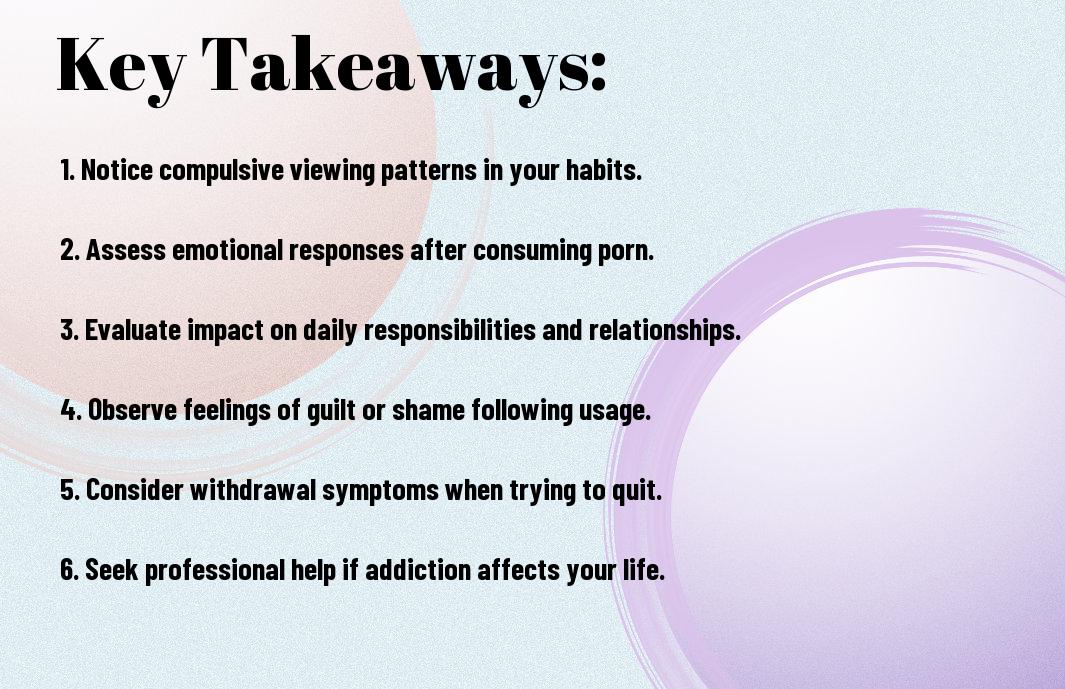Addiction to pornography can significantly impact your life, affecting relationships, self-esteem, and overall well-being. If you find yourself questioning your consumption habits or feel uncomfortable with your behavior regarding porn, you’re not alone. This post provides you with seven practical tips to help assess whether your engagement with pornography has crossed the line into addiction. By understanding the signs and patterns, you can take proactive steps toward healthier habits and a more balanced lifestyle.
Key Takeaways:
- Reflect on your viewing habits and consider whether your consumption of pornography feels excessive or out of control.
- Assess the impact of pornography on your relationships and whether it’s causing any dysfunction or emotional distance.
- Take note of any negative feelings that arise after consuming porn, such as guilt, shame, or anxiety.
- Examine if your porn use is interfering with daily activities, responsibilities, or hobbies you once enjoyed.
- Consider the extent to which you’re using porn as a coping mechanism for stress, loneliness, or emotional issues.
- Seek feedback from trusted friends or partners regarding your habits and their perceptions; they may provide insights you haven’t considered.
- Think about setting boundaries for your porn consumption and see how that affects your behaviors and feelings.


Understanding Porn Addiction
While many people view pornography as a normal part of life, it can develop into a problematic behavior for some. If you find yourself frequently reaching for porn despite wanting to cut back, it may be time to evaluate your relationship with it. For more insights on overcoming such challenges, check out How to Stop a Porn Addiction: Samarpan’s Practical Guide.
Definition and Signs
Between the typical consumption of adult material and an addiction lies a fine line that can be hard to identify. Key signs of porn addiction may include increasing tolerance, preoccupation with porn, or continued use despite negative consequences in your life, enabling you to differentiate between healthy habits and problematic behavior.
Psychological and Emotional Effects
About the potential impact of porn addiction extends far beyond your viewing habits. Many individuals experience feelings of guilt, shame, or anxiety related to their consumption, which can lead to withdrawal from social interactions and difficulties in intimate relationships.
Understanding these psychological effects is important for assessing how porn addiction may impact your overall well-being. You might find that your self-esteem is affected, leading to emotional disconnect or intimacy issues with partners. Acknowledging these consequences can motivate you to consider seeking help or finding healthier alternatives to meet your needs.

Identifying Your Relationship with Porn
Now it’s important to take a closer look at your relationship with porn. Understanding how it fits into your life can help you determine if it’s a healthy habit or a potential addiction. This process involves honest self-examination of your feelings, behaviors, and the impact of porn on your daily activities. By assessing your usage and the motivations behind it, you can gain valuable insights into whether your consumption aligns with your values and personal goals.
Self-Reflection Questions
One way to start this examination is by asking yourself some self-reflection questions. Consider whether you use porn to cope with stress, loneliness, or emotional issues. Think about how often you watch it and what feelings arise during and after viewing. These questions can help illuminate your motivations and desires, shedding light on whether your usage is a form of escape or a healthy expression of your sexuality.
Patterns of Use
Between moments of indulgence, consider the patterns that emerge in your porn consumption. Do you find yourself watching it daily or multiple times throughout the day? Pay attention to whether you seek it out during specific emotional states or situations. Recognizing these patterns can provide insight into your relationship with porn, highlighting any dependencies or unhealthy habits.
Porn can become a way to escape from reality, making it easy to fall into harmful consumption patterns. Be aware of how often you engage with it and the circumstances that trigger your usage. If you notice you’re reaching for porn during times of stress or boredom, it may signal an emotional reliance that could require attention. Tracking your habits and the context can further reveal whether your porn usage is fulfilling a need or becoming an unhealthy obsession.
Recognizing Negative Impacts
Your relationship with pornography can extend beyond mere consumption; it may significantly affect various aspects of your life. Understanding the signs of addiction is vital, as it can lead to emotional struggles, interpersonal issues, and a lack of fulfillment in daily activities. Being aware of these negative impacts can help you evaluate your relationship with porn and make informed decisions about seeking change.
Effects on Relationships
To identify the effects of porn on your relationships, consider how your viewing habits influence your connections with others. If you find yourself withdrawn or emotionally distant from your partner, it may be a sign that porn is interfering with your ability to engage meaningfully. Trust issues may also arise, leading to conflicts that can erode the foundation of your relationships.
Impact on Daily Life and Responsibilities
Relationships can often suffer due to the distraction that porn provides. Understanding your daily habits can reveal if you prioritize porn over necessary responsibilities such as work, errands, or social activities. If you often find yourself choosing to watch porn rather than engage in fulfilling tasks, your motivation and productivity in daily life might be significantly hampered.
Understanding the impact of porn on your daily life is vital for recognizing potential addiction. This interference may manifest as procrastination or neglect of personal and professional obligations. If you notice that tasks pile up or you find yourself constantly distracted, it may be time to assess your consumption habits and how they might be hindering your overall progress and satisfaction in life.
Practical Tips for Assessment
Once again, assessing your relationship with pornography can be a revealing process. Here are some practical tips to guide your evaluation:
- Reflect on your feelings about porn
- Monitor how often you engage with it
- Consider the impact on your daily life
- Evaluate your emotional responses before and after use
- Talk to someone you trust about your habits
Thou may find deeper insights through this assessment.
Journaling and Tracking Usage
Usage tracking can provide a clearer picture of how often and why you engage with pornography. Start by maintaining a journal where you log your viewing habits, noting the time, context, and feelings surrounding each experience. Doing so can help identify patterns, triggers, and moments where you may feel discomfort or guilt, guiding you to understand the role porn plays in your life.
Setting Boundaries
To regain control over your habits, setting boundaries is important. Identify specific times or situations where you usually consume porn and create rules for yourself to limit exposure. You can implement content blockers on devices or designate “no screen” times to encourage alternative activities. Doing this helps reinforce your commitment to mindful consumption and ultimately empowers you to prioritize healthier habits.
Consequently, establishing boundaries can lead to a more balanced lifestyle. By determining your limits, you are actively taking steps to reduce your reliance on porn, fostering awareness and accountability. This self-discipline not only improves your relationship with technology but also boosts your overall mental well-being.
Seeking Professional Help
All individuals struggling with porn addiction should consider seeking professional help. An experienced therapist can provide you with guidance, accountability, and the tools necessary to navigate your challenges. Therapy can help in understanding the underlying factors of your addiction and develop healthier coping strategies.
When to Reach Out for Support
On recognizing signs of addiction that affect your daily life, relationships, or mental well-being, it’s important to seek support. If you find yourself unable to control your urges or if porn consumption is interfering with responsibilities, reaching out to a professional can be a vital step. The sooner you take action, the more manageable your situation may become.
Types of Therapy Available
Across different therapeutic approaches, you can find various options tailored to treating porn addiction. Here’s a breakdown of some key types:
| Type | Description |
| Cognitive Behavioral Therapy (CBT) | Focuses on changing negative thought patterns that contribute to addiction. |
| Group Therapy | Provides a supportive environment where you can share experiences and learn from others. |
| Individual Counseling | Offers personalized insights and coping strategies tailored to your specific situation. |
| Couples Therapy | Helps improve communication and intimacy within relationships affected by addiction. |
| Mindfulness-Based Therapy | Teaches you to become more aware of your triggers and urges. |
Any of these therapeutic approaches can be effective in addressing your addiction and fostering personal growth.
Professional support also encompasses various methods to fit your needs and preferences. Understanding what each type entails can help you make informed decisions on which path to take. For example:
- Cognitive Behavioral Therapy aims to help you identify and change harmful patterns.
- Group therapy fosters community and shared healing experiences.
- Individual counseling offers a space for personalized exploration and strategy development.
- Couples therapy facilitates building stronger connections.
- Mindfulness techniques promote awareness and emotional regulation.
Any of these options can lead you towards a healthier relationship with yourself and your behaviors.

Building Healthier Habits
Despite the challenges you may face in overcoming a porn addiction, building healthier habits is vital for long-term success. By integrating positive routines into your daily life, you can effectively reduce reliance on pornography and foster a more fulfilling lifestyle. Focus on replacing negative behaviors with constructive activities, and you’ll start feeling empowered and in control.
Replacing Porn with Positive Activities
With a mindful approach to your free time, you can replace porn consumption with engaging and fulfilling activities. Consider hobbies, physical exercise, or social events that stimulate your mind and body. By immersing yourself in rewarding experiences, you’ll create a positive feedback loop that naturally shifts your focus away from pornographic material.
Developing a Support System
Healthier habits are easier to maintain when you have a strong support system in place. Surround yourself with individuals who understand your journey and can provide encouragement and accountability. Whether it’s friends, family, or support groups, having people to discuss your struggles and successes with can significantly enhance your ability to overcome addiction.
Support networks serve as a vital component of recovery, offering a safe space to share your feelings and experiences. Connecting with others who are on a similar journey can help you feel less alone and provide valuable insights and encouragement. Consider seeking out online forums or local support groups where you can find like-minded individuals who are committed to building a healthier lifestyle alongside you. The connection and shared understanding between group members can empower you to break free from addiction while fostering lasting relationships.
Summing up
With these considerations, you can better evaluate your relationship with pornography and identify if it has become an addiction. By examining your habits, emotional responses, and the impact on your daily life, you gain valuable insights into your behavior. Utilizing these practical tips helps you create a deeper understanding of your situation and empowers you to take positive steps toward change, if necessary. Ultimately, being aware of your choices will enhance your overall well-being and foster healthier relationships.
FAQ
Q: What are the common signs of porn addiction?
A: Common signs of porn addiction include spending excessive amounts of time viewing pornographic content, neglecting personal relationships or responsibilities, experiencing escalating urges to view porn, and feeling distress or guilt after consuming porn. Additionally, individuals may find it difficult to cut back or stop despite wanting to do so.
Q: How can I tell if my porn consumption is problematic?
A: If you notice that your porn consumption interferes with daily activities, such as work or social life, or if you’re using it as a coping mechanism for stress or emotions, it could be a sign of a problem. Furthermore, if you find yourself seeking out more extreme content to achieve the same level of satisfaction, it may indicate an unhealthy relationship with porn.
Q: What practical steps can I take to assess my porn habits?
A: To assess your porn habits, start by tracking the time spent viewing porn each week. Reflect on the feelings and thoughts you have before and after viewing. Journaling about your experiences can help clarify your relationship with porn. Consider whether you attempt to hide your usage or feel ashamed, as these can be indicators of a deeper issue.
Q: Can porn addiction affect my mental health?
A: Yes, porn addiction can have significant effects on mental health. It may lead to feelings of anxiety, depression, and low self-esteem. Additionally, individuals may experience relationship issues or difficulties with intimacy, as porn can distort expectations and perceptions of sexual relationships.
Q: Are there support resources available for those who suspect they have a porn addiction?
A: Yes, there are various support resources available, including therapy, support groups, and online forums. Professional therapy with a counselor experienced in addiction can be beneficial. Additionally, organizations like Sex Addicts Anonymous (SAA) provide a network of support for individuals seeking help.
Q: Is it possible to overcome porn addiction on my own?
A: Overcoming porn addiction on your own is possible, but it can be challenging. It often requires a deep understanding of your triggers and motivations, as well as the development of new coping strategies. Setting clear goals, creating a structured daily routine, and finding healthier activities to replace porn consumption can help. Seeking external support can enhance your chances of success.
Q: When should I consider seeking professional help for porn addiction?
A: Consider seeking professional help if your porn consumption is causing substantial distress in your life, impacting your relationships, or if you’re finding it increasingly difficult to control your urges. If attempts to curb your behavior have been unsuccessful, or if you feel overwhelmed, it may be beneficial to consult with a mental health professional who specializes in addiction.
